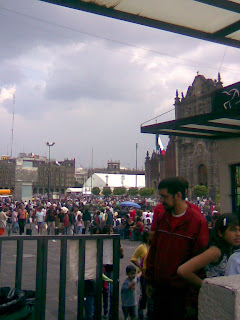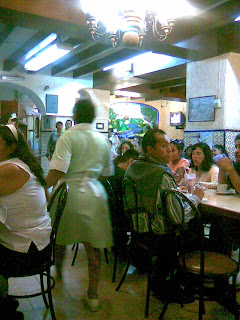It´s been a big week at our office..Leahy Blocks Positive Report on Mexico's Rights Record
Skepticism About Conclusions Delays U.S. Anti-Drug Aid
By William Booth and Steve Fainaru
Washington Post Foreign Service
Wednesday, August 5, 2009
MEXICO CITY, Aug. 4 -- A key senator rejected a State Department plan to issue a report this week affirming that Mexico is respecting human rights in its war against drug traffickers, delaying the release of millions of dollars in U.S. anti-narcotics assistance, according to U.S. officials and congressional sources.
The State Department intended to send the favorable report on Mexico's human rights record to Congress in advance of President Obama's visit to Guadalajara for a summit of North American leaders this weekend, U.S. officials familiar with the report said.
That plan was scrapped after aides to Sen. Patrick J. Leahy (D-Vt.), chairman of the Senate Appropriations foreign operations subcommittee, told State Department officials that the findings contradicted reports of human rights violations in Mexico, including torture and forced disappearances, in connection with the drug war.
At stake is more than $100 million in U.S. aid under the Merida Initiative, a three-year, $1.4 billion counternarcotics package begun by President George W. Bush in 2007. The law requires Congress to withhold 15 percent of most of the funds until the secretary of state reports that Mexico has made progress on human rights.
"Those requirements have not been met, so it is premature to send the report to Congress," Leahy said in a statement. "We had good faith discussions with Mexican and U.S. officials in reaching these requirements in the law, and I hope we can continue in that spirit."
Soaring Violence
The State Department's failure to push through the report is a setback for the U.S. and Mexican governments at a time when drug violence in Mexico continues to soar and President Felipe Calderón has come under growing pressure to revise his U.S.-backed anti-narcotics strategy, which relies heavily on the military to fight the cartels.
State Department officials said they are considering whether to rewrite the report before submitting it to Congress, probably after it reconvenes Sept. 7.
Mexico is likely to lose some of the money if it is not released by Sept. 30, U.S. officials said. U.S. aid under the Merida Initiative is used to buy helicopters and surveillance aircraft, train police, and improve intelligence-gathering in the fight against the drug cartels.
But congressional aides and human rights experts expressed doubt that the State Department would be able to make a compelling case that Mexico has made sufficient progress.
"In the area of prosecuting human rights abuses and ending the impunity, I don't believe we have seen any real progress," said Maureen Meyer, who oversees Mexico for the Washington Office on Latin America, a human rights group that opposes release of the funds. "There is no sign that people are being held accountable. Every major human rights group has opposed releasing the money."
Push for Transparency
Mexican officials acknowledge that human rights violations have occurred in the fight against traffickers but say the cases are isolated.
The Mexican government is sensitive to U.S. criticism about rights violations because the military is a respected institution -- and many Mexican leaders say the U.S. government has not done enough to reduce consumption of illegal drugs in the United States or stem the flow of weapons and cash heading south.
In recent weeks, frustrated U.S. officials have pressed the Mexican government, including Defense Secretary Guillermo Galván Galván, to provide additional information, according to three officials involved in the campaign.
Late last week, after the report was completed, Mexican officials disclosed details of a number of cases in which they said soldiers had been tried on charges of human rights violations, according to a U.S. official. He said the State Department is trying to verify whether the soldiers were prosecuted and has not decided whether to include the new information.
"We are looking for the Mexicans to be as transparent as possible," said a U.S. official who spoke on the condition of anonymity because of the sensitivity of the discussions. "We are pushing them to be more transparent than they think they can be. What happens when complaints are lodged? What do they do with them? What processes do they go through? What happens to individuals accused of abuses?"
A spokesman for the Mexican military said it would be unable to comment. Arturo Sarukhan, Mexico's ambassador to Washington, said Tuesday: "Mexico is unequivocally committed to ensuring the protection of human rights in the fight against drug-trafficking organizations." He added, "We are confident that this will be recognized by Congress."
140 Complaints a Month
Since Calderón launched his war against the cartels after taking office in December 2006, human rights complaints against the military have soared 600 percent, rising to 140 a month this year, according to government statistics. The National Human Rights Commission has issued reports on 26 cases involving the military since the beginning of Calderón's term, and it found evidence of torture in 17 of the cases.
In April, Human Rights Watch issued a report highlighting 17 cases, including several from 2007 and 2008, involving what it said were military abuses of more than 70 victims. The alleged abuses include killings, torture, rapes and arbitrary detentions. According to that report, "not one of the military investigations into these crimes has led to a conviction for even a single soldier on human rights violations."
On July 9, The Washington Post reported that the Mexican army had carried out numerous acts of torture, forced disappearances and illegal raids in pursuit of traffickers, according to court documents, political leaders and human rights monitors in Mexico's most conflicted regions.
With the State Department report imminent, many prominent human rights organizations in the United States and Mexico released advance statements saying that Mexico had failed to meet the Merida Initiative requirements and urging the U.S. government to withhold the money.
"Why is this so important? Because Mexico cannot win this fight against drug cartels without human rights protections. Human rights provisions are not a headache. They are absolutely critical to the success of the whole initiative," said José Miguel Vivanco, director of the Americas program at Human Rights Watch.
Carlos Cepeda, of the Miguel Agustín Pro Juarez Human Rights Center, said: "Mexico is not fulfilling the human rights requirements of the initiative and the government does not seem close to fulfilling them, and so of course it is a bad idea to release the funds. It would be a green light for further human rights abuses and for continued impunity for the military."
A Case Not Yet Made
Under Merida, the State Department is required to report to Congress on Mexico's progress in four areas: improving transparency and accountability; establishing regular consultations with civil institutions; ensuring that civilian and judicial authorities are prosecuting police and military officers credibly accused of violations; and prohibiting the use of testimony obtained through torture.
The most controversial of the provisions is determining whether the Mexican government is prosecuting human rights offenders. To date, the military has handled all allegations of crimes under its own justice system. U.S. officials and Mexican and international human rights groups say the Mexican military is secretive and hostile to scrutiny by outsiders.
Last month, amid growing allegations of abuses, Gen. Jaime Antonio López Portillo, head of the military's human rights office, held a news conference and announced that the military had prosecuted seven human rights cases dating to 1996, in which 12 members of the armed forces were found guilty of crimes, including homicide and kidnapping.
Only one of the completed cases appeared to date from the Calderón term. An additional 14 cases involving 53 troops were working their way through the military's judicial process, according to López Portillo.
The State Department had still intended to argue for the release of the Merida funds this week, U.S. officials said. But officials with the department's bureau of Western Hemisphere affairs got a chilly reception from Leahy's foreign policy expert, Tim Rieser, at a meeting last week. According to people familiar with the meeting, Rieser told officials that they had not made the case on any of the four areas required under Merida.
After receiving the additional information from Mexico, State Department officials went back to Rieser over the weekend to find out whether Leahy would support the report. He said he would not.
Next week Mexico's Supreme Court will address whether it is unconstitutional to try cases of human rights violations in military courts. The legal challenge, brought by the Miguel Agustín center, involves four civilians who were shot dead in Sinaloa state last year, allegedly by Mexican soldiers. Mexico's attorney general declined to take the case, and the military investigated the deaths instead.














